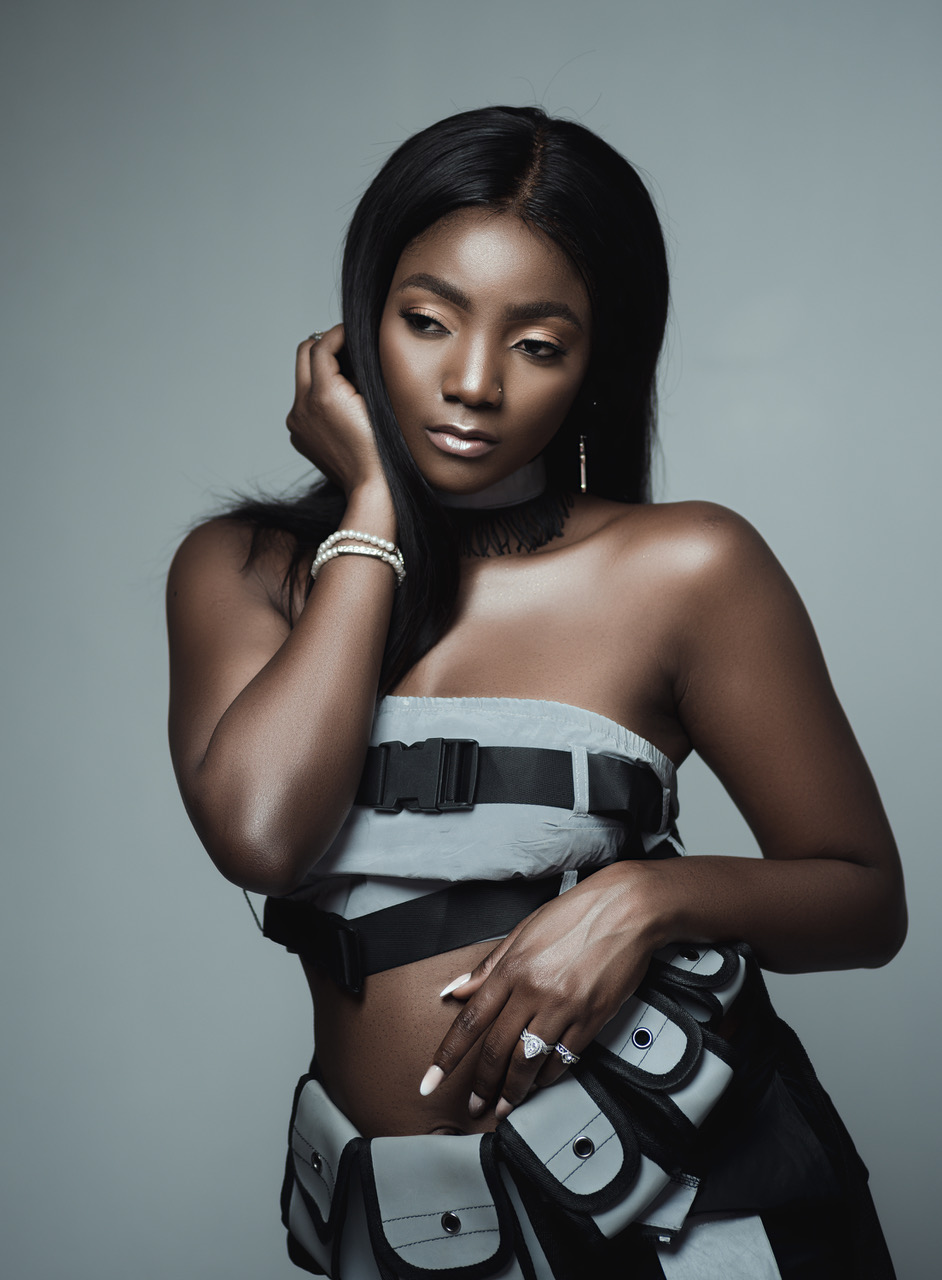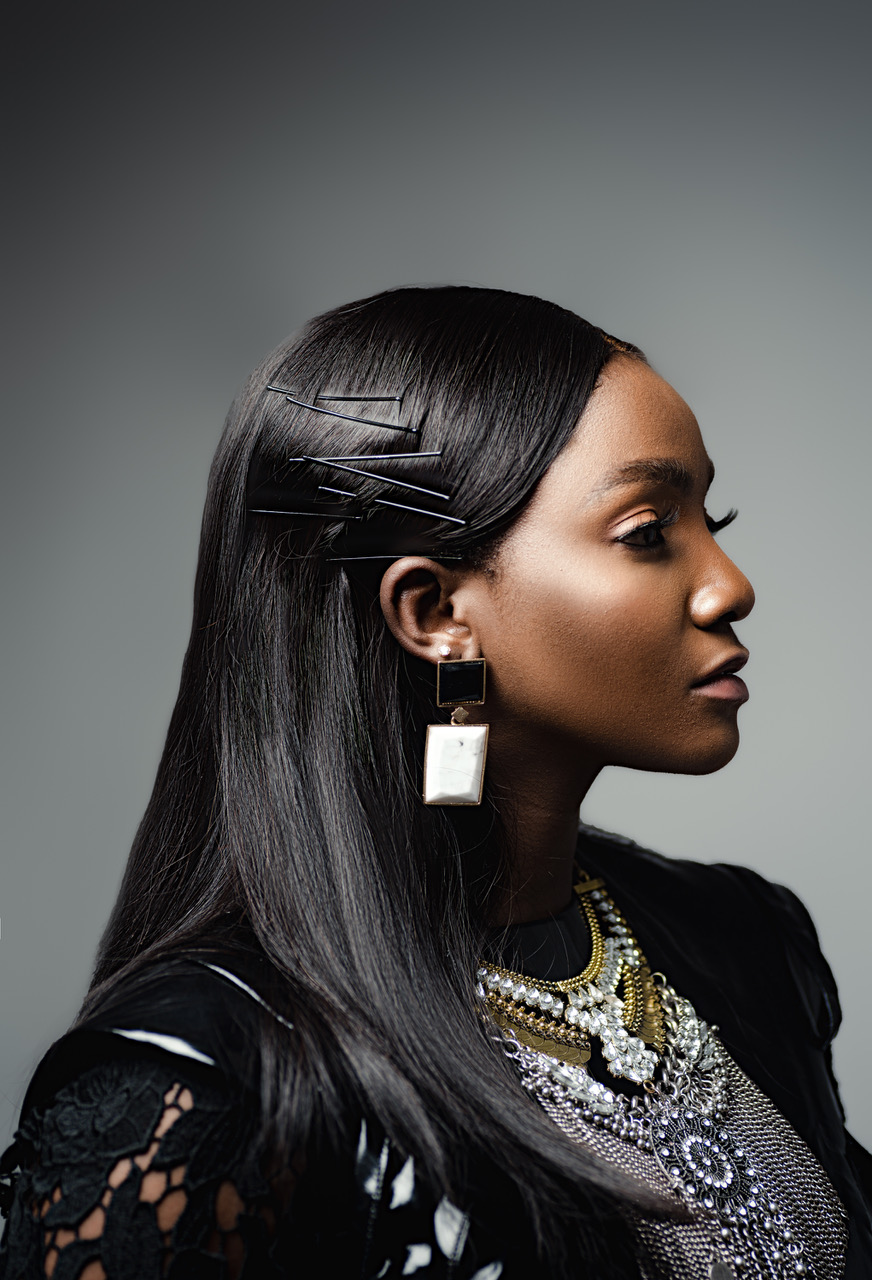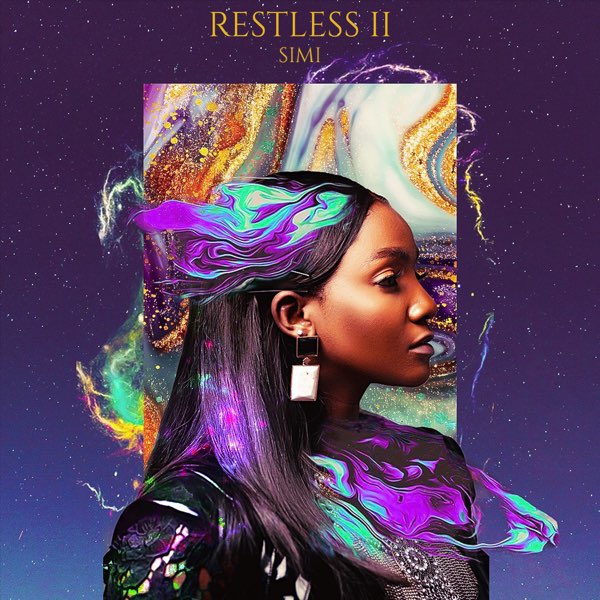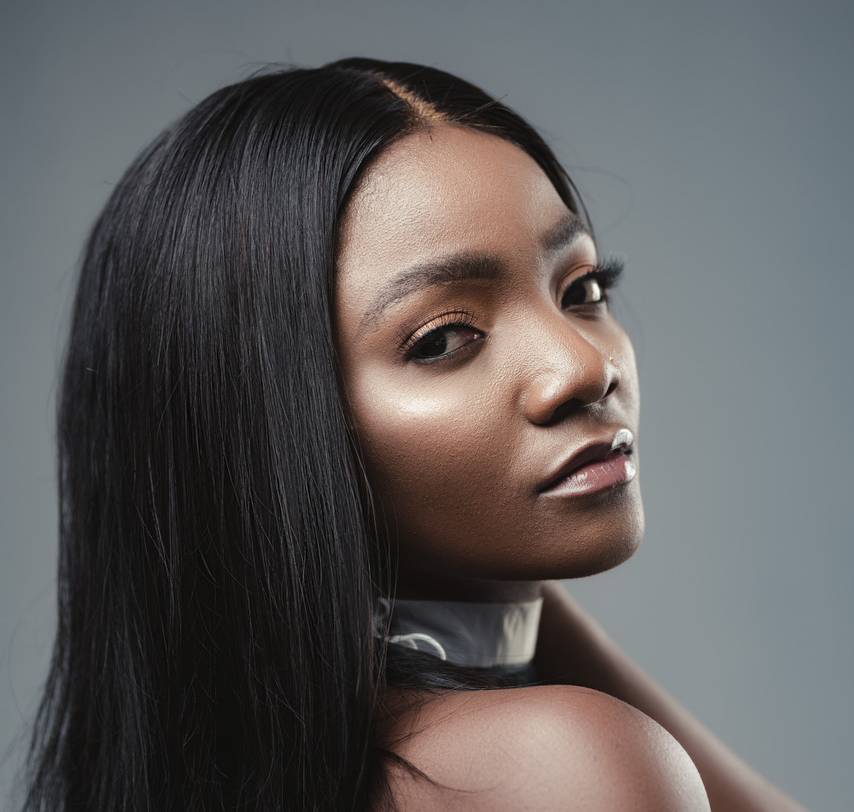The unrelenting Nigerian afropop singer breaks down her career thus far, her acclaimed Restless series, and the trials of being a mother and musician in a time of crisis.
The singer, born Simisola Ogunleye, rerouted from a promising gospel career to writing about love and emotions. Her trajectory was influenced by a subtle clamour for a break from the overwhelming supply of Afropop in Nigeria at the time. Simi’s lithe vocals, perky persona, ability to interweave relatable anecdotes & lingo into songwriting and sound engineering revealed her from the clutter. The singer single-handedly mixed and mastered her husband Adekunle Gold’s debut album, Gold. Her first EP Restless is a compilation of covers that provides her own spin on proven hits like Beyonce’s “Halo”, Rihanna’s “Man Down”, Bruno Mars’ “Grenade”, Adele’s “Set Fire to the Rain”, OneRepublic’s “Apologise”. Simi centers love as the primary theme of her artistry which she expressed in different forms in tracks like “JAMB Question”, “Tiff”, “Love Don’t Care”, “Joromi” etc.
Her debut album, Simisola which peaked at number 5 on the Billboard World Albums Chart is revered as one of the most critically acclaimed albums in contemporary Nigerian music. Barely a year later, Simisola broke the record for the first album to garner over a million streams on Boomplay, the leading music streaming service in Sub-Saharan Africa. In that record year, Simi emerged one of the biggest winners at the Headies Award where she snagged Album of the Year (Simisola), Recording of the Year (“Joromi”) and Best R&B Single (“Smile For Me”) awards in one night. Simi also beat Cameroon’s Salatiel, Daphne; Malawi’s Dawson, Angola’s Anselmo Ralph to emerge Songwriter of the Year (“Smile For Me”) at the All Africa Music Awards (AFRIMA) within the same record year. The artistic blend of Simi and Falz in “Jamb Question” (remix) and “Soldier” saw the duo maximize their epiphanous allure with a seven-track EP, Chemistry. In 2019, Simi furthered her course with Omo Charlie Champagne, her third studio album whose genre spans across sentimental ballad, afropop, afrosoul, dancehall and more. The album title is dedicated to her father Engr. Charles Oladele Ogunleye who passed in 2014. In a year that would’ve been earmarked as sabbatical for the singer following her pregnancy and motherhood, Simi abated stereotypes with “Duduke” and “Know You” (alongside Ladipoe), two of Nigeria’s biggest records in 2020. “Duduke” scooped the inaugural Best Written Song award and “Know You”, Best Collaboration at the recent Headies. Simi also emerged Best Female Artist, Western Africa at the African Muzik Magazine Awards & Music Festival (AFRIMMA) in 2020
The singer recently released Restless II which she reveals was inspired by her husband, Adekunle Gold. The six-track EP with assists from Wurld, Ms Banks, and Adekunle Gold reflects the singer’s state of mind at the time. “I was pregnant, I just left my record label and started my own company. There were too many new-unfamiliar phases at once. That’s where the restlessness came from” says Simi. Here, Simi speaks to PAM about music as her biggest outlet, smashing stereotypes and being unapologetically vocal about causes she’s drawn to.

2020 was relatively interesting for Simi; from motherhood to “Duduke”, Platoon, Restless II etc. Tell us, how do you feel?
Totally blessed especially as the year 2020 was such a wild one for many people and the world at large with the pandemic, Black Lives Matter, End SARS etc. In all, I feel really blessed that I’m able to have these testimonies of mine in the midst of the chaos. I’m not sheltering myself from reality however. I’m totally happy and I’m also always putting everyone in my prayers.
Congratulations on your AFRIMMA win for Best Female Artist West Africa. Did you envisage all these feats within such a period?
Not exactly. The one thing people will tell you about being pregnant and right after having a baby is that things tend to go down because your attention is divided and your priority is changing. Honestly, a big part of me expected that would happen. In fact, it kind of went that way in the earlier part of my pregnancy. Even before announcing I was pregnant, I felt like I have to constantly prove myself even after I’ve done that time and time again. It’s something about people opining that because you’re with child, your value should be lower. It makes absolutely no sense. I think because my team and I foresaw that, we planned ahead. Especially earlier in my pregnancy when I had more energy, I put things together to ensure I have something going when I’m not able to work as much. Interestingly, it didn’t happen the way I’d thought it would and I’m glad that we were able to exceed expectations.
What does it mean to you to inspire a village with such show of tenacity?
I’m really proud of myself because adding to God’s grace, I did put in the work and I’m happy to see it pay off. Initially, I was scared it might turn out a certain way but then it didn’t. It reaffirmed the belief that if you put your heart into something you cherish, you’ll likely get results. I mean, I don’t want to sound like a privileged brat because there are people who work hard and don’t necessarily get what they want. I’m just honoured that I was able to achieve and exceed what I intended. I’m also glad that I was able to foster a mentality that being pregnant doesn’t mean one should be totally counted out – not just for myself but also for other women. Now, I know I’m capable of anything.
What inspired your earlier transition from Gospel to secular music?
Actually, I wasn’t doing Gospel because I started singing in the church choir or something. It was just where my heart was. Also, as trying to write love songs wasn’t working at the time, I settled for Gospel which came to me effortlessly. I remained in that space till I started to write differently and about more experiences. It’s relatively hard for me but I prayed to God that if secular music is not his will for me, then it shouldn’t work out. When it started to work out, I just guessed I was on the right path. I pride myself on the fact that I’m a genuine person and whatever I do, even if I’m making a mistake, I don’t have any sinister intention. I just let myself go on and enjoy the process therein.
There’s something intriguing about how you brilliantly lace storytelling to your music. Tell us about it?
It’s probably because I talk a lot [laughs]. It’s probably from a part of me that feels like when you paint a picture with the music, people connect to it better. I don’t tell as many stories like I used to, like in my debut album Simisola. I enjoy painting pictures; I want people to be able to picture what’s happening when they listen to the music. I think it’s a way to have them connect more to what I’m saying and it’s a great selling point.
‘Duduke’ emerged one of the biggest records in Nigeria last year. What went through your mind while making that song?
I just wanted to sing for my baby. I wanted to sum the emotions that I felt while I was pregnant and music happens to be my best outlet. At first, I was unsure about putting it out. It comes with being African whereby you just want to keep such a thing private until it [delivery] finally happens but I was itching to share. So, I said why not? It’s that simple.
What’s your take on people alluding the entire success of the song to the sentimentality of being pregnant?
I don’t care, really [laughs]. I don’t go around blowing my own trumpet but I do know for sure that I’m good at what I do. I put in the work and nobody will say I can’t sing because I know that I sure can. I’m not the best singer in the world but I can sing. So, if anyone thinks the only reason why a song is doing well is because I’m pregnant, I honestly don’t care. If that’s why you’re listening to it, good for you. If they liked it because I’m pregnant, that’s not necessarily a bad thing. There are also people listening to it for other reasons, good for them too.
Your stint as a sound engineer isn’t talked about enough. You have mixed and mastered critically acclaimed records, projects etc. How did you dabble into that aspect of music making?
I’m a perfectionist hence there’s a certain way I like to hear things. A lot of people are wary about working with me because until I hear what I want, I won’t stop. I don’t even bother faking it. That’s really one of the reasons I had to learn engineering – by reading articles on Google and watching Youtube videos. When I started, I realized that I actually enjoy it, which is about the best way to get me to do something. To an extent, I have good ears which is a prerequisite in sound engineering; everything just aligned. I already know what I want and it’s easier for me to do it than asking people to. I also enrolled in a music production school for three months, just so I could learn to create beats. Although, I have a more natural connection with sound engineering than production.
Totally admirable. We’d thought Restless II would take after Restless I being a compilation of covers. Tell us about these ‘Restless’ series.
[Laughs] I called them ‘Restless’ as they reflect my state of mind. Even for Restless I, I didn’t name it that because they were covers but because it was also how I was feeling at the time. I wasn’t signed yet and I remember doing a lot of covers whereby I just get the beat on Youtube, but I wanted the next step to happen for me, so I was restless literally. I hadn’t blown yet and covers are about the best way to garner attention when starting out. For Restless II, I was pregnant, just left my record label and started my own company – there were too many new-unfamiliar phases at once. That’s where the restlessness came from. I also don’t think covers would’ve done much for me as it did back then.

What triggered the bold move to create a project from such a period?
My husband did. I was going through this horrible morning sickness at the time and he suggested I make an R&B project. I was concerned about putting my energy into that because I know Nigerians do not regard R&B. I also hadn’t done R&B in a while. First, I started downloading some R&B beats on Youtube just to inspire me. I took my time because it was a passion project. That’s where the inspiration crystallized.
What do you aim for with this project amongst your discography?
First, it’s to show how diverse I can be, so nobody ever doubts that I can do more because I think sometimes, when they hear my name, they think of highlife or some Dancehall-infused record like Jericho. Also, it’s like a transition and I’m carrying my fans on a journey. People accept change more if you give it to them gradually as opposed to just springing it up. Interestingly, my next project can sound like Simisola or something else. I just don’t want people to get too comfortable or me becoming too predictable.
What about the Nigerian music industry would you like to see change going into the future?
I’m so glad that a lot of new artists don’t have to go through the middlemen anymore to get what they deserve. I however still feel like there’s such a potential for massive income in streaming that we have not tapped into yet but I think that’s linked to how accessible the internet is to the average Nigerian person. I don’t think people download bootleg copies because they don’t want to patronize you. It’s just because that’s what they can afford. The reason why someone in America can stream your music 100 times in three days is because they have data for it. The potential for streaming is one that we’re yet to tap into here but it’s much better than it was.
You’re very vocal about certain causes on social media. Do you experience a case of people around trying to hush you sometimes?
People will always try to hush you especially if you’re a woman but like I said, I don’t care. If I care about something enough, I will speak – though I don’t speak as much as I do now because of the climate. You have to be careful but if it’s important to me, there’s no way I won’t speak up or say something especially if people are depending on my voice because they don’t have as big of a voice. If I believe in something hard enough, I will say it. If anyone tries to hush me, it’s on them.
Listen to Simi in our One Dance playlist on Spotify and Deezer





